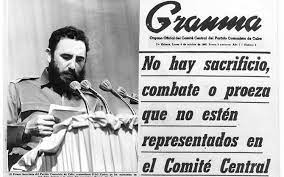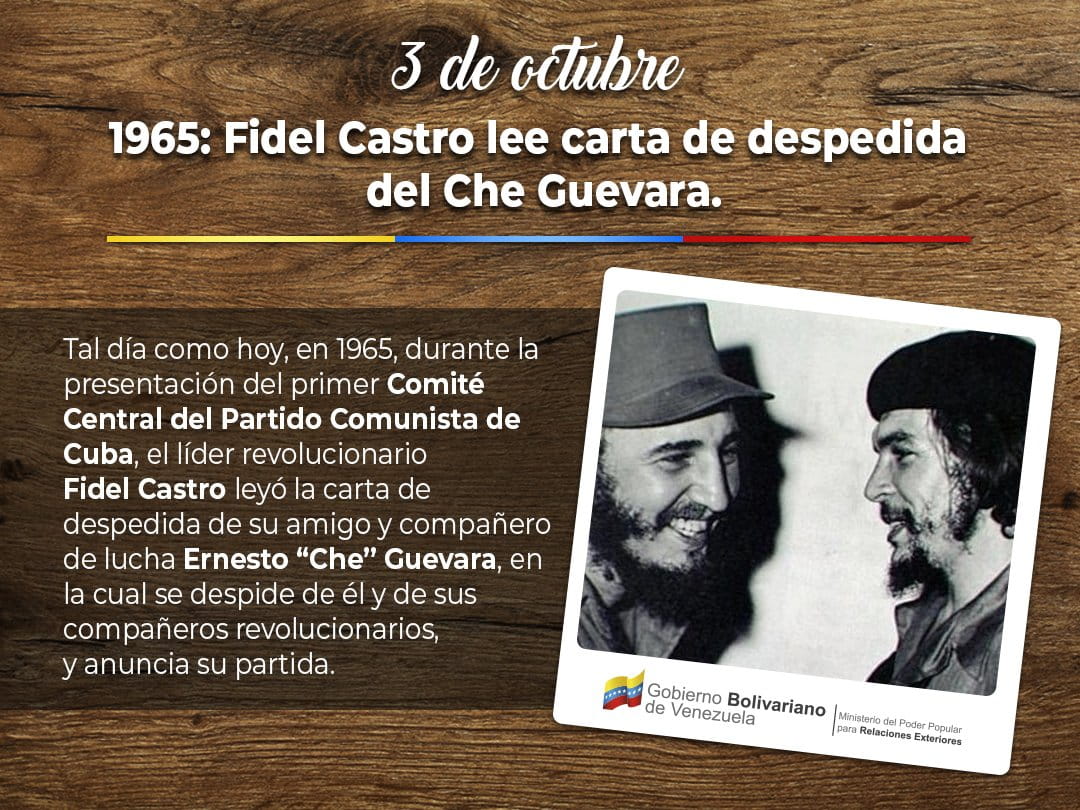
Havana: Historical Event of October 3
Havana, as the capital of the country, has been the venue for many of the most important events that have occurred in our country for more than six decades after the victory of the Revolution.
And one of those particularly significant and emotional moments is related to the date of October 3, 1965 when the first Central Committee was constituted and it was approved that the party organization be identified as the Communist Party of Cuba.
From the first day, a large number of base leaders of the until then United Party of the Socialist Revolution of Cuba had met at the Chaplín theater in Havana.
It was at that meeting that, in addition to the above, the birth of the Granma newspaper was also agreed upon, as the official organ of the Central Committee of the Party, and its first edition was produced on October 4.
At the closing of that meeting, the maximum leader of the Revolution highlighted the historical importance of the emergence of the Central Committee of the Party and also made reference to the general characteristics of those who made up said Committee.
He pointed out in this regard: that there was no heroic episode in the history of our country in recent years that was not represented there and immediately assured that “...there is no sacrifice, there is no combat, there is no heroic feat —both military and civil— or creator who is not represented; there is no revolutionary, social sector that is not represented.”
Fidel also specified that this Central Committee in its first meeting had adopted different agreements, among them ratifying the measures agreed upon by the former National Directorate, ratifying the Political Bureau, the Secretariat and the work commissions, as well as the elected partner for the position of Secretary of Organization.
Another moment of special connotation occurred in that closing ceremony of the Cuban party meeting, when Fidel explained the reasons why the name of Commander Ernesto Che Guevara did not appear among the members of the Central Committee of the Party.
Fidel stated that to explain this he would read a letter in Che's own handwriting that is self-explanatory.
He immediately carefully read the farewell letter that Che Guevara wrote to him when he decided to leave Cuba in the course of that year 1965 to give his contribution to the cause of the revolutionary struggle of other peoples in the world.
In one part of said letter, Che specified: “I feel that I have fulfilled the part of my duty that tied me to the Cuban Revolution in its territory and I say goodbye to you, to my comrades, to your people, which is already mine. "I formally resign from my positions in the Party Directorate, from my position as Minister, from my rank as Commander, from my status as a Cuban. Nothing legal ties me to Cuba, only ties of another kind that cannot be broken like those appointments.”

Other lands of the world claim the support of my modest efforts. I can do what is denied you by your responsibility at the head of Cuba and the time has come for us to separate. Know that I do it with a mixture of joy and pain: here I leave the purest of my hopes as a builder and the most beloved among my loved ones... And I leave a town that accepted me as a son; that lacerates a part of my spirit. In the new battlefields I will carry the faith that you instilled in me, the revolutionary spirit of my people, the feeling of fulfilling the most sacred of duties: to fight against imperialism wherever it is: this comforts and more than heals any tear. “
Che also specified: "I say once again that I release Cuba from any responsibility, except that which emanates from its example. That if the definitive hour comes to me under other skies, my last thought will be for this people and especially for you. That I thank you for your teachings and your example and that I will try to be faithful to the last consequences of my actions. That I have always been identified with the foreign policy of our Revolution, and I continue to be. That wherever I stop I will feel the responsibility of being a Cuban revolutionary, and as such I will act.”
And after concluding the reading of Che Guevara's letter, Fidel commented:
Those who speak of the revolutionaries, those who consider the revolutionaries as cold men, insensitive men, or men without guts, will have in this letter the example of all the feeling, of all the sensitivity, of all the purity that can be enclosed in the soul of a revolutionary.”
Fidel explained that Che also left letters for his parents, his children and for some of his close companions.
And in the final part of his speech on October 3, 1965 in Havana, Fidel also meant that an entirely new era is emerging in the history of our country, a different form of society, a different system of government; the government of a party, of the workers' party, made up of the best workers, formed with the full participation of the masses, to be able to say with all justification and with all reason that it is the vanguard of the workers and that it is the representation of workers in our workers and revolutionary democracy.
And then he specified: “And it will be a thousand times more democratic than bourgeois democracy, because we will march towards administrative and political forms that will imply the constant participation, in the problems of society, of the masses, through the appropriate organisms, through the Party, at all levels.”
A little more than ten years later, the Communist Party of Cuba held its first congress, exactly between December 17 and 22 in the same theater where the meeting held in 1965 took place, only that at that moment the building was identified , precisely, with the name of Karl Marx.
This congress had the peculiarity that in addition to the closing ceremony in the aforementioned facility, it actually took place in the Plaza de la Revolución "José Martí", in Havana, its symbolic closure in a large popular concentration in which hundreds participated. of thousands of Cubans.
Speaking at that act, Fidel assured the people: “Today I just want to tell you —in that conviction and in that confidence that our path, wide and beautiful, opens ahead— that this act, this meeting today between the Party and the masses, between the Central Committee and the masses, constitutes one of the most extraordinary events of our revolutionary process, and one of the happiest days of our lives.”